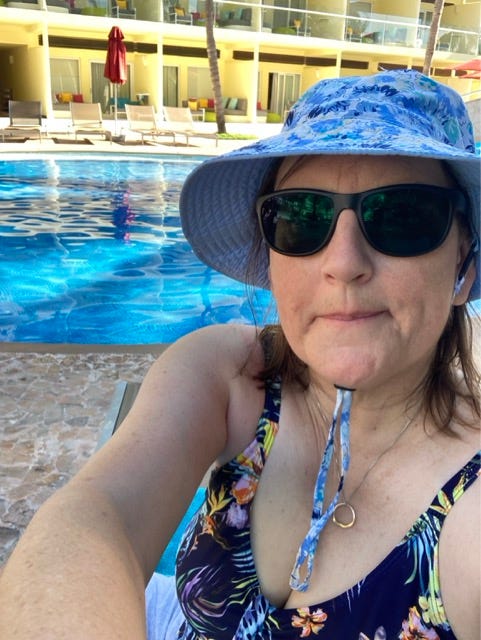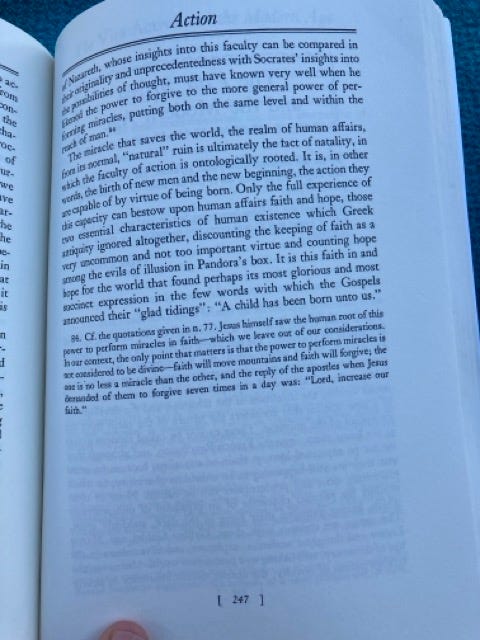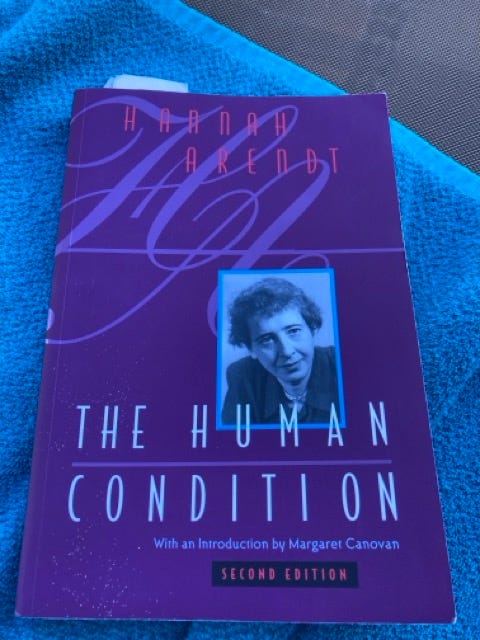Reading Arendt's Human Condition
An invitation to Samantha Rose Hill's course coming up in July.
Early readers of Pose Ponder know I’m a big fan of Hannah Arendt. Several years ago, I took a course offered through the Brooklyn Institute on Arendt’s Life of the Mind, taught by Arendt scholar Samantha Rose Hill.
Samantha has since published a very nice biography of Arendt, Hannah Arendt, in the Critical Lives series, which I highly recommend. You can read more about the book and Arendt’s biography here, The Philosopher’s Trail: On Samantha Rose Hill’s “Hannah Arendt” | Los Angeles Review of Books (lareviewofbooks.org).
Today I enrolled in a new course also taught by Sam, this time for a guided reading of Arendt’s The Human Condition, the book originally published in 1958.
The course will be offered on Tuesday evenings this summer for four weeks, from July 16 - August 6, 2024. The cost is $335 for four 3-hour (!) live sessions, 6:30 - 9:30pm ET.
As I know from experience, this is a fantastic opportunity to read through and discuss a seminal text and to get to know Arendt’s thought and writing, all guided by an engaging philosopher-scholar. For me, it will be about my fourth full study (!) of The Human Condition. Her works have sufficient depth and richness that they bear continued re-reading. This is a hallmark of Great books, and Arendt is in my personal canon, for sure.
If you have the time and mental space, and are up for a historical, literary, and philosophical challenge this summer, please join me in enrolling:
From the course blurb:
What does it mean to be human in the world today? Hannah Arendt’s The Human Condition (1958) is a provocative treatise on what it means to live on earth and share the world in common. Her study, originally intended to be titled Amor Mundi (Love of the World), investigates the central activities of human life—labor, work, action—and their corresponding realms—private, social, public. For Arendt, The Human Condition is about protecting spaces of freedom and the ways in which we move through the world.
You can read the rest of the course description and enroll at the Brooklyn Institute’s course page.
To give a taste of what to look forward to, in the following video Sam is in conversation with renowned philosopher of violence Brad Evans, reflecting on The Human Condition, Arendt’s “most prescient work.”
[The book] offers readers a vocabulary for thinking about the relationship between thinking and action, the spectre of technology, the rise of the social, the loss of privacy, political action, identity politics, alienation, and the loss of freedom in modernity. What does it mean to inhabit the earth and make the world in common? When, if ever, is violence politically necessary? Can the democratic principle of freedom survive in the 21st century? This conversation with Arendt scholar Samantha Rose Hill reflects upon the seismic impact of Arendt’s book, as well as its impact in our contemporary era in which our understanding of violence is constantly evolving.
Feel free to explore Sam’s writing here on Substack as well, on various topics, including recent research for her forthcoming book on loneliness.
Is loneliness making us more totalitarian? (substack.com) with an excerpt and link to the original article published at Politico.
Or this post written from the Bodleian library in Oxford!
If you do sign up for the course, please let me know!
I’d love for readers of Pose Ponder to come together and talk about Arendt, this important book, and what we’re learning from the course, in the context of how to be good humans in the Anthropocene.
Postscript
What else better do you have to do this summer?
“Hannah Arendt is not exactly a beach read!” — Thus was I scolded by a good friend when I texted the above photo to him last year. I was lounging poolside in Mexico and — I kid you not — brought this book with me. 🤣
Don’t believe me? Photos texted before and after.




And on this passage:






Good for you! As a fellow--what? Arendt admirer? Arendtian? Arendt enthusiast? Whatever--I agree with your assessment of Arendt & her importance to our situation now, as well as what it was in the 1950s. I've not taken a class from Samantha, but got to know of her when she was with the HA Center @ Bard College & a part of the HA Virtual Reading Group there (where we're now reading EICHMANN IN JERUSALEM, after having recently finished ORIGINS & read THC not too long ago). I, too, appreciated Samantha's recently published bio.
I am on HAC’s email list and am perpetually tempted to join the reading group. Someday!